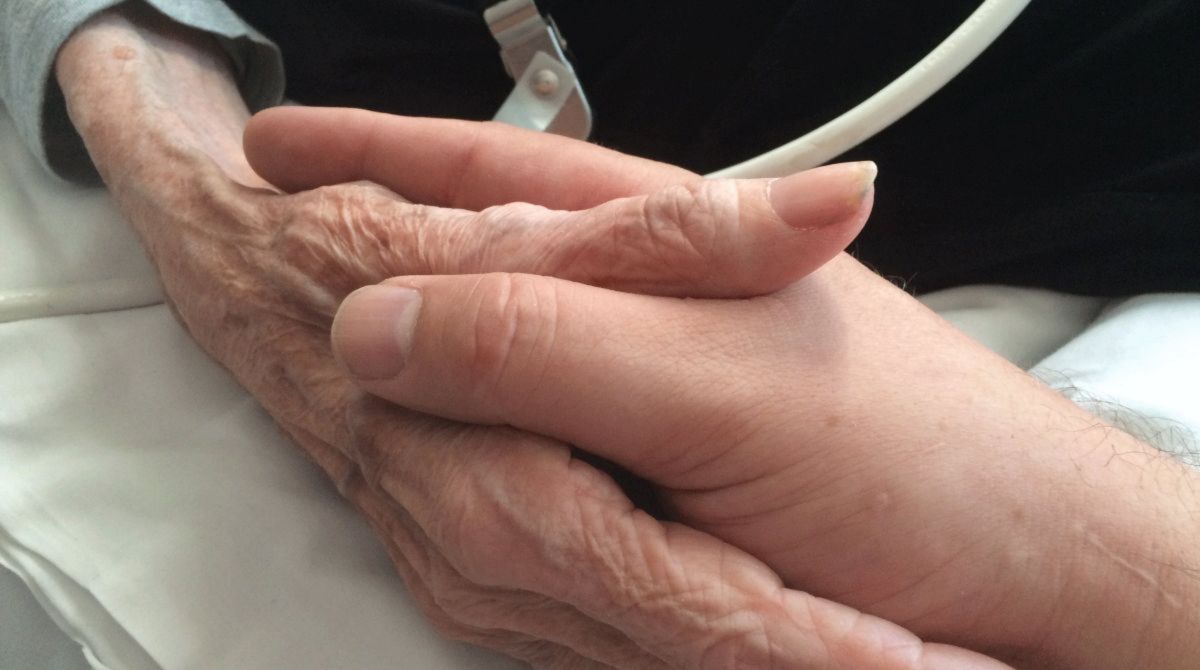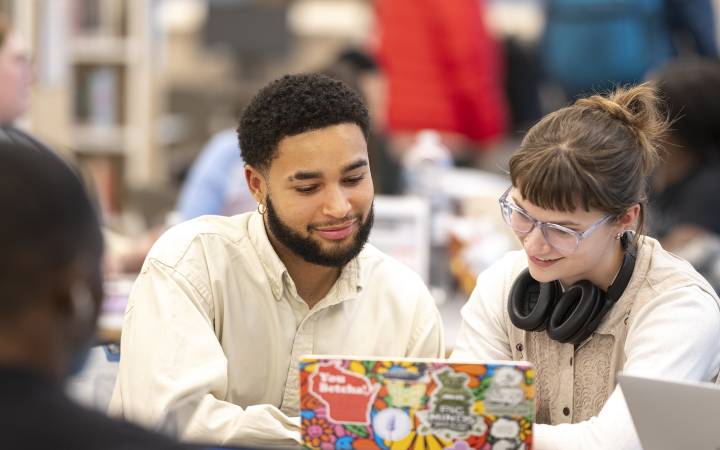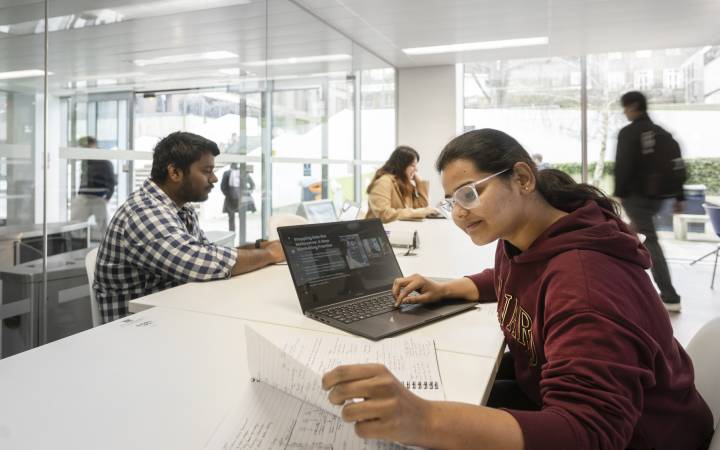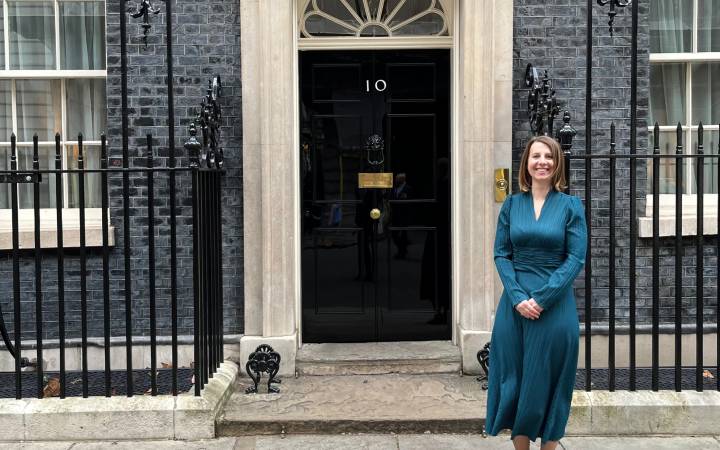"When a national emergency hits it's the sort of thing that really keeps you awake at night" – leading Kingston University health researcher on coronavirus impact on hospices
Posted Monday 6 July 2020

Professor of Health Research at Kingston University and St George's, University of London, Fiona Ross, has played a critical role in ensuring a local charity, Princess Alice Hospice has had the resources, capacity and headroom to continue with its high quality end of life and palliative care during the coronavirus lockdown.
Professor Ross, former Dean of the Faculty of Health, Social Care and Education, run jointly by Kingston and St George's, is Chair of the Board of trustees at the hospice, which covers a population of 1.3 million and provides community services across 600 square miles of Surrey and south west London.
She explains how Princess Alice Hospice is coping with the pandemic lockdown and the opportunities academics and professional services staff can take to play a wider role in the local community.
What inspired you to extend your work in the community in a non-executive role?
I started as a district nurse and in the late seventies worked as a staff nurse at St Christopher's Hospice. At that time, it was a hub of excellence with Cicely Saunders and other giants of nursing and medicine putting palliative care on the map. I learnt how good nursing care and attention to the little things that often matter most to patients, can make a real difference.
After that I did my PhD and took an academic route, but I have always believed in the importance of high quality palliative care. I worry it tends to be neglected in professional training and healthcare practice.
Looking back, I was probably approached to be a trustee, as at the time the board was short of trustees with a clinical and health perspective - there were lots of accountants, investment managers and lawyers. A good board needs to be diverse with a balance of skills.
I was motivated by the values of the hospice and wanted to contribute beyond my paid role. Having relevant experience helps. Universities are sometimes criticised for being inward looking – so in my view, taking on a non-executive role for a charity or healthcare organisation is an important part of the University reaching out and fulfilling its civic responsibility.
 Professor of Health Research at Kingston University and St George's, University of London Fiona Ross.
Professor of Health Research at Kingston University and St George's, University of London Fiona Ross.
What have been the challenges for hospices during the coronavirus outbreak?
When a national emergency hits that no one has ever experienced before, it really is the sort of thing that keeps you awake at night. Two things worried me most at the start.
The first was that Covid-19 patients were being discharged to our services, but staff at the hospice had no protective equipment. The community came up trumps making scrubs, and local universities repurposed labs to make visors. This was great, but not sustainable and once we got the hospice to be recognised as being a health provider, we were entitled to be part of the supply chain for PPE distribution.
The second worry was financial sustainability. Of course, with lockdown the charity faced an abrupt end to retail and fundraising income. Princess Alice is a medium-sized charity and around 20 per cent of income is from the NHS, with the rest coming from charitable sources. Fortunately, the hospice has benefited from the government furlough scheme and emergency fund to replace lost fundraising income – otherwise the hospice would have been faced with severe cuts in services. It was a nail-biting time.
The emotional circumstances around restricting visiting, looking after patients through the impersonal PPE uniform, and sometimes having to refuse admissions as the hospice did not have the equipment, were very hard for staff. Ultimately, as Chair, you're responsible for everyone's welfare and safety.
The role of the Chair is to stand back to allow senior managers to manage, but to be there to steer, support, add value and challenge. In an emergency, it is even more important that trustees do not get in the way of the day to day. So we decided to streamline reporting at the hospice upwards and held informal, light touch and virtual board meetings with managers to ensure oversight and support throughout the anxiety, uncertainty and emotional challenges of the acute pandemic surge.
What are your biggest achievements in handling the pandemic?
I am most proud of how the pandemic has triggered transformation across all corners of Princess Alice. The staff have been amazing, turning themselves upside-down to solve difficult problems in new ways. This is in spite of a third of the hospice's workforce, from medical consultants to community nurses, being off sick with coronavirus symptoms or self-isolating.
The biggest transformation has been in the way the hospice's services have been delivered using more digital technology. Although digital transformation is a strategic goal for the organisation, the implementation has been slow – but no more.
As we had done the scoping, prepared staff and had the kit in place, the hospice was able to move to remote clinical consultations almost overnight. We have also been doing most of our community work virtually. We've taken a blended approach which has transformed and expanded how many people we can see and what we can do. The patient and public response has been really good.
As well as this, we are successfully running education sessions for care homes, wellbeing services for patients and bereavement support virtually with a lot of volunteer participation – including some of our trustees.
What else needs to change?
One of the things I do alongside Princess Alice, is Chair a Forum of Hospice Chairs in London. This is a conduit for the voices of end of life care in the capital to influence and contribute to policy development. Through the lobbying work of Hospice UK, there was a successful response from the government that saw hospices receive emergency support. What we need now is a proper conversation about how end of life care is funded and valued within a sustainable health and society care system.
There are lots of ways to chip away at this, which includes raising the issue with MPs. Good quality end of life care is a lottery, it is variable across the country and questionable whether local communities can continue to fund 80 per cent of the palliative care effort – this isn't sustainable.
We need to establish what is the right funding mix of charitable versus government spend to support good quality end of life care – there's a lot of work to be done.
What would you say to anyone else thinking of taking on a similar opportunity?
It's been an awesome experience to lead governance and strategic development of an excellent provider Charity. I would really encourage academics and senior staff from professional services to look for non-executive opportunities, because you can give so much and learn even more.
Contact us
General enquiries:
Journalists only:
- Communications team
Tel: +44 (0)20 8417 3034
Email us



